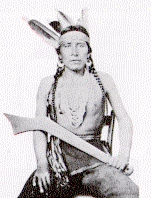
You know how the war started -- by the killing of some white people near Acton, in Meeker county. I will tell you how this was done, as it was told me by all of the four young men who did the killing. These young fellows all belonged to Shakopee's band. Their names were Sungigidan ("Brown Wing"), Ka-om-de-i-ye-ye-dan ("Breaking Up'), Nagi-we-cak-te ("Killing Ghost"), and Pa-zo-i-yo-pa ('Runs against Something when Crawling'). I do not think their names have ever before been printed. One of them is yet living. They told me they did not go out to kill white people. They said they went over to the Big Woods to hunt: that on Sunday, Aug. 17, they came to a settler's fence, and here they found a hen's nest with some eggs in it. One of them took the eggs, when another said: "Don't take them, for they belong to a white man and we may get into trouble." The other was angry, for he was very hungry and wanted to eat the eggs, and he dashed them to the ground and replied: "You are a coward. You are afraid of the white man. You are afraid to take even an egg from him, though you are half-starved. Yes, you are a coward, and I will tell everybody so." The other replied. "I am not a coward. I am not afraid of the white man, and to show you that I am not I will go to the house and shoot him. Are you brave enough to go with me?" The one who had called him a coward said: "Yes, I will go with you, and we will see who is the braver of us two." Their companions then said: "We will go with you, and we will be brave, too." They all went to the house of the white man (Mr. Robinson Jones), but he got alarmed and went to another house (that of his son-in-law, Howard Baker where were some other white men and women (Jones, Baker, a Mr. Webster, Mrs. Jones and a girl of fourteen). Then they hitched up a team belonging to another settler and drove to Shakopee's camp which they reached late that night and told what they had done, as I have related.
The tale told by the young men created the greatest excitement. Everybody was waked up and heard it. Shakopee took the young men to Little Crow's house (two miles above the agency), and he sat up in bed and listened to their story. He said war was now declared. Blood had been shed, the payment would be stopped, and the whites would take a dreadful vengeance because women had been killed. Wabasha. Wacouta, myself and others still talked for peace, but nobody would listen to us, and soon the cry was "Kill the whites and kill all these cut-hairs who will not join us." A council was held and war was declared. Parties formed and dashed away in the darkness to kill settlers. The women began to run bullets and the men to clean their guns.
At this time my village was up on Crow creek, near Little Crow's. I did not have a very large band -- not more than thirty or forty fighting men. Most of them were not for the war at first, but nearly all got into it at last. A great many members of the other bands were like my men; they took no par in the first movements, but afterward did. The next morning, when the force started down to attack the agency, I went along. I did not lead my band, and I took no part in the killing. I went to save the lives of two particular friends if I could. I think others went for the same reason, for nearly every Indian had a friend that he did not want killed; of course he did not care about anybody's else (sic) friend. The killing was nearly all done when I got there. Little Crow was on the ground directing operations. The day before, he had attended church there and listened closely to the sermon and had shaken hands with everybody. So many Indians have lied about their saving the lives of white people that I dislike to speak of what I did. But I did save the life of George H. Spencer at the time of the massacre. I know that his friend, Chaska, has always had the credit of that, but Spencer would have been a dead man in spite of Chaska if it had not been for me. I asked Spencer about this once, but he said he was wounded at the time and so excited that he could not remember what I did. Once after that I kept a half-breed family from being murdered; these are all the people whose lives I claim to have saved. I was never present when the white people were willfully murdered. I saw all the dead bodies at the agency. Mr. Andrew Myrick, a trader, with an Indian wife, had refused some hungry Indians credit a short time before when they asked him for provisions. He said to them; "Go and eat grass." Now he was lying on the ground dead, with his mouth stuffed full of grass, and the Indians were saying tauntingly: "Myrick is eating grass himself."
When I returned to my village that day I found that many of my band had changed their minds about the war, and wanted to go into it. All the other villagers were the same way. I was still of the belief that it was not best, but I thought I must go with my band and my nation, and I said to my men that I would lead them into the war, and we would all act like brave Dakotas and do the best we could. [Big Eagle's Account, Through Dakota Eyes]
